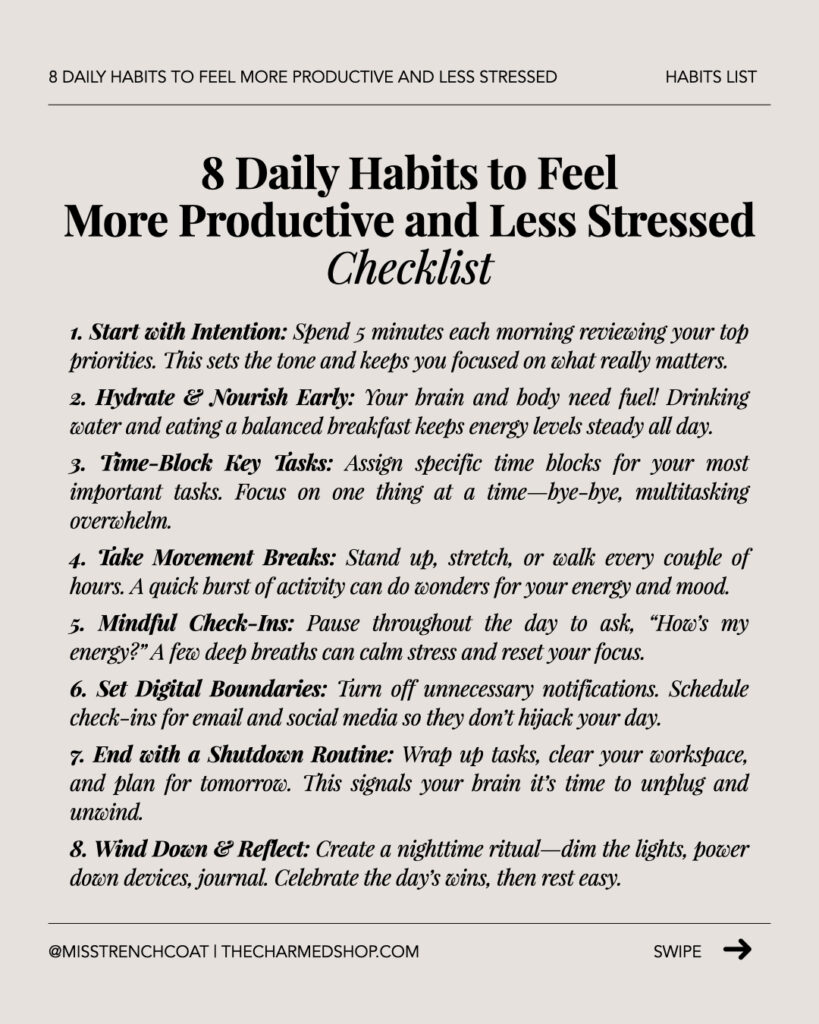
Feeling overwhelmed by your daily to-do list? You’re not alone. The pace of modern life can leave us juggling countless priorities—often at the expense of our health and peace of mind. Fortunately, by making a few simple changes and building small habits into your daily routine, you can regain a sense of calm and focus. Below are eight tried-and-true habits designed to help you stay productive without burning out.
1. Start Your Day with Intention
How often do you wake up and jump right into a flurry of tasks—checking emails, skimming social media, and gulping down coffee on the run? Instead, spend 5–10 minutes setting a clear intention for the day. Visualize how you want the day to go and jot down your top priorities. This simple practice grounds you in a positive mindset and gives you a roadmap for success.
Quick Tip: Choose a quiet spot (even if it’s just the kitchen table before the family wakes up), close your eyes, take a few deep breaths, and think about one word that represents the energy you want to carry with you—like “calm” or “focused.”
2. Hydrate & Nourish Early
Your brain and body need fuel to function optimally, so start the day by giving them the basics. Drinking water first thing in the morning rehydrates you after hours without fluids. Follow up with a balanced breakfast—think protein, complex carbs, and healthy fats—to keep your energy stable and your mind sharp. Skipping meals or relying on caffeine alone can lead to energy crashes and make you more susceptible to stress.
Quick Tip: Keep a glass of water beside your bed and drink it as soon as you wake up. Then plan a quick, nutritious breakfast—overnight oats, a protein shake, or eggs and whole-grain toast are all efficient, energizing options.
3. Time-Block Your Key Tasks
If you’ve ever ended the day thinking, “Where did the time go?”, time-blocking might be your lifesaver. Break your day into dedicated segments for your most important tasks, whether that’s project work, answering emails, or personal errands. By focusing on just one task at a time, you reduce the mental clutter that comes from constant multitasking.
Quick Tip: Set alarms on your phone or calendar to signal the start and end of each time block. When the alarm rings, move on to the next segment—this helps keep you on schedule.
4. Take Movement Breaks
Sitting for extended periods can drain your energy and escalate stress. Your body thrives on movement, so integrate short bursts of activity—like stretching or a brief walk—every couple of hours. These mini-breaks promote better circulation, ease tension in your muscles, and re-energize your mind, helping you return to work refreshed.
Quick Tip: Try doing a quick set of squats, lunges, or a simple yoga pose during your break. Even a two-minute stretch can make a noticeable difference in how you feel.
5. Practice Mindful Check-Ins
Stress often creeps up on us when we’re not paying attention to our mental state. Pause every few hours to take a quick inventory: How is my energy level right now? Am I feeling stressed or anxious? If you’re feeling off, it’s a sign to take a brief break, grab some water, or just breathe deeply. These mindful moments help prevent overwhelm and keep you grounded.
Quick Tip: Set a reminder on your phone that says “Mindful Check-In.” When it goes off, close your eyes, inhale deeply for four counts, hold for two, then exhale for four. Repeat until you feel centered again.
6. Set Boundaries Around Digital Distractions
Smartphones, social media, and constant notifications can be productivity killers. Decide ahead of time when you’ll check email or scroll through social feeds, rather than letting them dictate your day. Turning off non-essential notifications and closing distracting tabs during work hours can have a profound impact on how efficiently (and peacefully) you operate.
Quick Tip: Schedule “communication windows” at specific times. Outside those windows, silence your phone or place it face-down so that you’re not tempted to respond to every buzz.
7. End Your Workday with a Shutdown Routine
Without a clear boundary between work and personal time, stress has a way of leaking into your evening. Spend the last 10–15 minutes of your workday wrapping up tasks, reviewing any unfinished business, and planning your top goals for tomorrow. That way, you’ll give your mind permission to unplug from work-mode when you’re done.
Quick Tip: Physically “closing the day” can be as simple as tidying up your desk, logging off your computer, and saying out loud, “Work is done for today.” This signals your brain that you’re transitioning out of work mode.
8. Wind Down & Reflect
Racing thoughts about tomorrow’s tasks can sabotage a good night’s sleep. Create a relaxing bedtime ritual—dim the lights, turn off screens at least 30 minutes before sleep, or read something that calms your mind. Taking a few minutes to journal about your day—what went well, what didn’t—can help you process events and release any lingering stress.
Quick Tip: End your journal entry with a brief gratitude list. Focusing on what you appreciate can shift your mindset to a more positive place, setting you up for better rest and a brighter morning ahead.
Putting It All Together
The key to a more productive, less stressful life lies in weaving small, consistent habits into your day. By starting each morning with intention, maintaining steady energy levels, limiting distractions, and finishing your day with a clear wrap-up, you build a strong foundation for long-term balance and success. These daily actions may seem minor on their own, but together they can create a powerful ripple effect that leaves you feeling more in control and less overwhelmed.
Remember: Productivity isn’t about doing more; it’s about doing what matters most—and doing it with clarity, calm, and intention. So, pick a few of these habits (or all eight!) and integrate them into your routine. Over time, you’ll notice a significant shift in both your output and your mental well-being.
Ready to Take Your Productivity to the Next Level?
If you found these habits helpful and want to dive even deeper into creating a life that feels truly balanced, I invite you to join my upcoming How to Plan for a Balanced and Successful Life in 2025 workshop. In this live session, I’ll walk you through practical strategies for setting meaningful goals, aligning your daily habits with your bigger vision, and simplifying your planning routine to reduce overwhelm.
Which one of these habits feels most crucial for your current lifestyle? Share in the comments below—I’d love to hear how you plan to adopt these tips and make 2025 your most productive (and least stressed) year yet!
xoxo,

